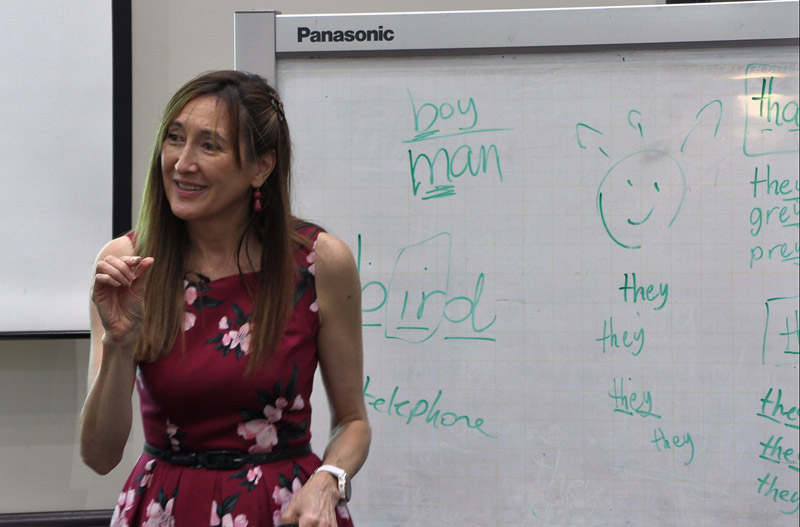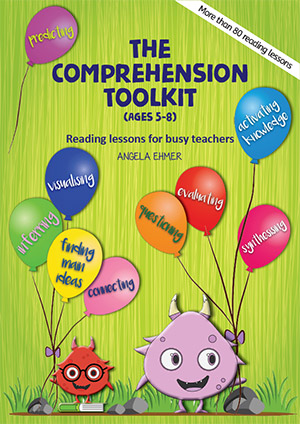The crucial link between early language and long term learning
Author: Angela Ehmer
From the moment a precious baby enters the world, a parent’s life is irrevocably changed. Gone are many of the luxuries that were taken for granted, and in their place is that miraculous person that you would do anything for and want without reservation to protect from the world.
Parents want for their children, long happy and successful lives, free from suffering and without pain and hardship. They want them to find success in their pursuits and engage in life’s journey of learning without difficulty.
So why is it that when children enter school, some hit the ground running and experience success from their earliest moments, whilst others either struggle from the outset, or take much longer to acquire the necessary skills for learning. The answer is simple. It is a combination of genetics and environment. Environmental conditions include factors such as the nourishment, care, surroundings and stimulation the child receives.
When examining the factors which determine academic success, it is undisputed that genetic makeup plays a significant role. However, what has become clear and unarguable is the important role of early language experiences and environment on later school achievement.
It has been long documented that we learn more in the first four years of life than in the years that follow. It is now known that the quality, quantity and nature of the interactions we have with our children, contribute to their future learning success. Scientists believe that intellectual growth is not the only benefit, but healthy social and emotional development also occur.
Statistics on early literacy development are strongly linked to long term success. In fact, the greatest measure of long term academic success has been shown to be early achievement at school. Early achievement is closely linked to the the early language experiences of the child. This means that the role of parents, carers and significant others is crucial in shaping the successes of individual children.
When examining the reasons why early language experiences influence later learning, it is important to address how the brain develops. Focused research about the brain has occurred for over twenty years, and recent findings by neuroscientists with the assistance of brain imaging technologies, are providing greater insight into the way early language shapes later development.
At birth a baby’s brain has approximately 100 billion neurons, or nerve cells. The number of brain cells will not increase over time, however the manner in which a baby’s brain is stimulated and nurtured will form and strengthen the complex networks required for information to be passed between neurons for thinking, learning, memory, sensing and feeling.
Most neural networks are formed after birth, and are established in response to the experiences provided by others. Positive, loving environments with a rich diet of healthy stimulation engaging all senses and an abundance of language and literature, is the perfect foundation for nourishing a child’s developing brain. Stimulation of this type causes new connections to form neural pathways and strengthen existing ones.
PET scans (position-emission tomography) allow scientists to see and measure activity in the brain. When stimulated electrical activity is excited and information is passed between neurons. The brain literally lights up with activity and when this occurs, not only is learning taking place, but the synaptic structures which transmit messages between neurons actually thicken and grow as a direct result of stimulation. In this process, the brain literally continues to build itself over time and with experience.
Adversely, when babies, infants and young children receive limited stimulation, the synapses fail to develop, and many will eventually die. What does this actually mean? It’s simple, intellectual potential is enhanced as a result of rich experiences. A lack of experiences limits the intellectual potential of the child. Early language experiences are the most important in determining long term academic success, regardless of the subject area.
How can parents provide an environment where rich stimulation occurs?
Encourage talk
Engaging children in daily conversation about their world is particularly important in helping them to learn the language structures used in everyday speech. Chat to them as they are “doing” things, encouraging them to articulate their actions, thoughts, ideas and feelings as they learn about their world.
Encourage play and discovery
Provide safe opportunities for your child to explore and discover new things through play. This includes playtimes with children their own age to develop socialization skills.
Read aloud
A variety of books in the daily diet will extend children’s understanding of language structures and make the task of learning to read easier.
Written language can be very different to the natural structures used by young children. Children exposed to a rich variety of books are more conversant with how written language is constructed.
For example, “Once upon a time …” is a common story beginning. The child familiar with fairy tales knows that this is how they begin, so without any effort is able to read the first four words. The child without exposure to such stories, needs to “work out” each of the words in order to read them. In short, the more a child is read to, the more a child will internalise the variety of structures which exist in a language.
The benefits of reading aloud to children extend far beyond developing an understanding of language. Read aloud allows them to experience things that they cannot in their own world. For example, a child born in rural Australia can learn much about the beach or the snow from literature. How does this help the child? It broadens their understandings of the world. Not only does this “grow” intelligence, but it makes later reading much easier, by giving them greater insight into things that might come up in books.
It can be difficult for some children to sit still and listen to books. It is important to make book time fun, enjoyable, exciting, stress free and loving, so don’t battle the “lively listener”. Wait until he needs some quiet rest time, and enjoy a couple of good books then. How many? Three a day and you’ll be ahead of the game. Any more is icing on the cake. If the child continues to choose the same favourites, that’s fine. You’ll suffer, but your child will still gain.
Sing songs and rhymes
Nursery rhymes were once a foundation of growing up. Today they are sometimes replaced by the bells, whistles, flashing lights and tunes as children engage in a variety of multimedia. It is vital to include a rich abundance of rhymes which the children are able to recite over time. Studies of successful readers show that these children could recite many nursery rhymes by heart prior to starting school.
Tip: Doing the actions will help children to remember the rhymes.
Limit television
Limit the time children spend watching television and videos. Monitor what they view, so that you can be sure they are learning things you want them to learn. Be aware that whilst lots of language is used on television, children are usually passive viewers. This means that most television is not a provider of what is considered the rich language that children need for later learning.
In Summary
- A child’s genetic makeup can be enhanced by the quality and quantity of the experiences provided.
- The quantity, quality and type of stimulation children receive between the ages of birth and four years is a major factor in predetermining how soon literacy skills are acquired. This in turn is a major determinant of long term academic success.
- The first ten years are critical for brain development. During this time, most of the connections used throughout life are formed, and this is also the period during which the brain is most receptive to learning language.
- Stimulation builds the brain, and repeated experiences consolidate learning and promote understanding.
- Engaging all the senses heightens learning. So provide experiences where your child can feel, smell, look, taste and listen. The more senses at once, the better the learning. (Then get them to talk about it.)
- Children learn by doing. Keep the hands active and the brain will thrive. (Encourage conversation about the “doing”.)
- A nutritious diet is essential for healthy brain functioning and development.
The most crucial times for learning occur prior to school commencement, and this is the time where the least funding is directed to children’s care and education. The important role that parents and carers play in early language development is acknowledged as a major determinant in future learning. Neurologists, psychologists and educators are now acutely aware of the significant roles of both nature and nurture in long term academic achievement.




